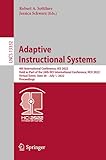Adaptive Instructional Systems [electronic resource] : 4th International Conference, AIS 2022, Held as Part of the 24th HCI International Conference, HCII 2022, Virtual Event, June 26 – July 1, 2022, Proceedings /
Material type: TextSeries: Lecture Notes in Computer Science ; 13332Publisher: Cham : Springer International Publishing : Imprint: Springer, 2022Edition: 1st ed. 2022Description: XXI, 316 p. 121 illus., 105 illus. in color. online resourceContent type:
TextSeries: Lecture Notes in Computer Science ; 13332Publisher: Cham : Springer International Publishing : Imprint: Springer, 2022Edition: 1st ed. 2022Description: XXI, 316 p. 121 illus., 105 illus. in color. online resourceContent type: - text
- computer
- online resource
- 9783031058875
- User interfaces (Computer systems)
- Human-computer interaction
- Education -- Data processing
- Social sciences -- Data processing
- Computer vision
- Data mining
- User Interfaces and Human Computer Interaction
- Computers and Education
- Computer Application in Social and Behavioral Sciences
- Computer Vision
- Data Mining and Knowledge Discovery
- 005.437 23
- 004.019 23
- QA76.9.U83
- QA76.9.H85
Learner Modeling and State Assessment for Adaptive Instructional Decisions -- Heart Rate Variability for Stress Detection with Autistic Young Adults -- Bayesian Cognitive State Modeling For Adaptive Serious Games -- Player State and Diagnostics in Adaptive Serious Games - Suggestions for Modelling the Adversarial Contradiction -- Adaptive Learner Assessment to Train Social Media Analysts -- A Review of Automatic Detection of Learner States in Four Typical Learning Scenarios -- Learner Modeling in Conversation-based Assessment -- Adaptation Design to Individual Learners and Teams -- Adaptively Adding Cards to a Flashcard Deck Improves Learning Compared to Adaptively Dropping Cards Regardless of Cognitive Ability -- AIS Challenges in Evaluating the Selection of Learner Interventions -- Iterative Refinement of an AIS Reward System -- Examining Two Adaptive Sequencing Approaches for Flashcard Learning: The Tradeoff between Training Efficiency and Long-term Retention -- Designand Development of Adaptive Instructional Systems -- Development of AIS Using Simulated Learners, Bayesian Networks and Knowledge Elicitation Methods -- Promoting Equity and Achievement in Real-time Learning (PEARL): Towards a Framework for the Formation, Creation, and Validation of Stackable Knowledge Units -- SatisfAI: A Serious Tabletop Game to Reveal Human-AI Interaction Dynamics -- A Framework for the Design and Development of Adaptive Agent-Based Simulations to Explore Student Thinking and Performance in K-20 Science -- Adaptive Instructional System for Complex Equipment Trainings in the Post-covid Era: Breaking the Ice of Time-Consuming Tasks -- Learning Support and Evaluation of Weight-shifting Skills for Novice Skiers Using Virtual Reality -- ILoveEye: Eyeliner Makeup Guidance System with Eye Shape Features -- Evaluating the Effectiveness of Adaptive Instructional Systems -- Lessons Learned from Creating, Implementing and Evaluating Assisted E-Learning Incorporating Adaptivity, Recommendations and Learning Analytics -- Development of the Assessment Toolkit for Leader Adaptability Skills (ATLAS) -- Measurements and Interventions to Improve Student Engagement through Facial Expression Recognition -- Assessing the Social Agency of Pedagogical Agents in Adaptive Training Systems. .
This book constitutes the refereed proceedings of the 4th International Conference on Adaptive Instructional Systems, AIS 2022, held as part of the 23rd International Conference, HCI International 2022, which was held virtually in June/July 2022. The total of 1271 papers and 275 posters included in the HCII 2022 proceedings was carefully reviewed and selected from 5487 submissions. The AIS 2022 proceedings were organized in the following topical sections: Learner Modeling and State Assessment for Adaptive Instructional Decisions; Adaptation Design to Individual Learners and Teams; Design and Development of Adaptive Instructional Systems; Evaluating the Effectiveness of Adaptive Instructional Systems.


There are no comments on this title.